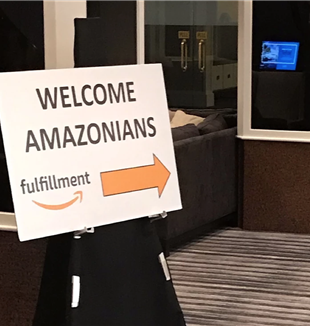To Prime or Not to Prime?
On Amazon and Idolatry
I’ve been on a fiction kick. Ever since finishing my master’s thesis, I find that my drive to read hardcore theology and cultural commentaries has been waning and my thirst to escape into an imaginary realm has become all the more demanding. That’s why I’m always looking for interesting book reviews or recommendations from a friend. As soon as something incites my interest, I make my way into Amazon Prime, and, with the click of a button, I find my heart inflamed with expectation for the moment, in 1-2 business days, when I will receive the key to a new imaginary world right on my doorstep.
This mystical experience was challenged, however, as I prepared to moderate this year’s Albacete Lecture, featuring William T. Cavanaugh (which he went on to publish with Commonweal magazine). A professor at De Paul University, Dr. Cavanaugh has long been on my radar of thinkers who shake up my worldview. We had gone back and forth over the phone discussing the theme of his lecture and how he intended to integrate it with the life and legacy of the Lecture’s namesake, Monsignor Lorenzo Albacete—self-proclaimed “member of the Mystical Party” and, to my mind, the Apostle of the Incarnation to the Secular World. I was intrigued by Cavanaugh’s topic: idolatry and consumerism in a secular age. He told me he planned to use the works of some of my most beloved thinkers—like Max Weber and Charles Taylor—to develop his thesis.
My excitement quickly faded when I read the preliminary transcript of his lecture. He started by citing an utterly disturbing article written by a former Amazon worker, who described the ungodly conditions inside an Amazon warehouse. Cavanaugh went on to name Amazon as the prime (pun slightly intended) example of the consequences of contemporary secular idolatry.
In simple terms, consumerism has become our idol du jour. The euphoria of receiving an object of one’s desire through mere clicks on a screen has become a pseudo-religious experience for many. The ugly side of this earthly euphoria—and of Amazon not actually being God—is that somebody ends up losing. At some point, we will not be totally satisfied with the temporary fulfillment offered by the product we just bought. But, more immediately, the warehouse worker who made sure I got my product in a superhumanly short amount of time is treated in a super-inhumane way.
I felt convicted for depending on Amazon to get my fulfillment fix. But I was most struck by what Cavanaugh said during the Q & A session after the Lecture. He said that our dependence on Amazon implies less of a moral threat and more of a threat to our happiness and fulfillment as human beings. (And this is where Albacete’s fixation on the Incarnation comes into play.)
He spoke about how he stopped using Amazon to buy books and started frequenting a local, independently-owned bookstore. He remarked that, since quitting Amazon, he is amazed by how much more fulfilling and more human it is to walk into a bookstore, meet the person selling him books, be able to ask them questions, and bump into other people who happened to be looking for books in the same section as he. This carnal, relational experience responds more fully to the human need for communion, for meaning and love to take flesh. . . which Jesus came to fulfill in the ultimate sense.
After the lecture was over, I decided to test out Cavanaugh’s proposal. Would I be more fulfilled going to a bookstore to buy a book as opposed to clicking a few buttons on Amazon and waiting for it to magically appear on my doorstep?
I set out on a Saturday morning to go to a used bookstore, which happened to be where I got my first summer job eleven years ago. Unfortunately, I got lost on my way there, forgetting which back roads to turn up. Since Saturday mornings are notoriously busy in town, I had to spend even more time hunting down a parking spot.
Finally, I got into the store and walked past one of my former bosses, who, much to my disappointment, did not recognize me at all. I started looking for the book in question, only to get distracted by the seemingly limitless collection of used books. After wandering into the Latin American History section, I started eavesdropping on a conversation between a mom and her young daughter, who was overwhelmingly excited to buy a new book.
Focus, Stephen! You’ve wasted enough time already driving around looking for parking. Get on with finding that book already! I quickly walked over to the literature section, only to find that the book in question was not there. Maybe it’s in the new releases section? Or maybe somebody left it carelessly in another section? The only way I could find out for sure was by asking the guy at the counter, the same one who forgot who I was–which made me not want to go through the awkwardness of asking him for the book and then explaining to him that I used to work for him eleven years ago.
Finally, I found it in the featured section right by the checkout. I wanted to get out without reminding my former boss of who I was, but then got distracted, yet again, by a display of $1 books. Just when I thought this wild adventure was over, I heard a voice, “Stephen!”I looked all around me. . . ”Stephen!”
It was my younger brother, who I haven’t reached out to in a while. We made quick small talk, filling each other in on what had been going on in the past few weeks. It left me with a feeling of sadness for not reaching out to him more and not being more involved in his life.
After I made my way back to my car, I looked at my new book and thought to myself Wow…I could’ve avoided this strange combination of excitement, frustration, awkwardness, sadness, and exhaustion if I had just stayed in the comfort of my bed and ordered this book off of Amazon.
This may be true. But I also realized how Dr. Cavanaugh’s claim was just as true. The pain of embarking on this journey from my bed all the way to the bookstore engaged my humanity, my heart, and my desire for fulfillment in a way that ordering the book off of Amazon never would have. As inconvenient and uncomfortable as it was, it reminded me of my need for communion and for a fleshly promise of meaning in my daily life, a promise which I cannot procure for myself, but must beg for from Another.
So, as much as Amazon may make life more comfortable and convenient, the reality is that human nature is neither comfortable nor convenient. Now, while I don’t intend to take a vow to never use Amazon again, I do intend to be more attentive to this “inconvenience” of my own humanity, because this inconvenience is bound to become either a problem to be “fixed,” eliminated, or—in the words of Monsignor Albacete—“a Mystery to be lived.”



